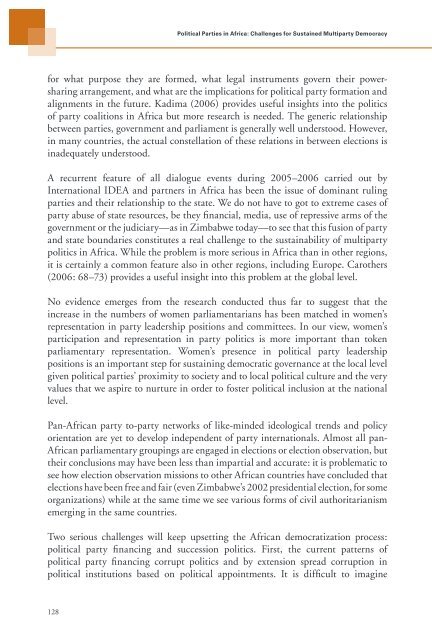Political Parties in Africa: Challenges for Sustained Multiparty
Political Parties in Africa: Challenges for Sustained Multiparty
Political Parties in Africa: Challenges for Sustained Multiparty
You also want an ePaper? Increase the reach of your titles
YUMPU automatically turns print PDFs into web optimized ePapers that Google loves.
<strong>Political</strong> <strong>Parties</strong> <strong>in</strong> <strong>Africa</strong>: <strong>Challenges</strong> <strong>for</strong> Susta<strong>in</strong>ed <strong>Multiparty</strong> Democracy<br />
<strong>for</strong> what purpose they are <strong>for</strong>med, what legal <strong>in</strong>struments govern their powershar<strong>in</strong>g<br />
arrangement, and what are the implications <strong>for</strong> political party <strong>for</strong>mation and<br />
alignments <strong>in</strong> the future. Kadima (2006) provides useful <strong>in</strong>sights <strong>in</strong>to the politics<br />
of party coalitions <strong>in</strong> <strong>Africa</strong> but more research is needed. The generic relationship<br />
between parties, government and parliament is generally well understood. However,<br />
<strong>in</strong> many countries, the actual constellation of these relations <strong>in</strong> between elections is<br />
<strong>in</strong>adequately understood.<br />
A recurrent feature of all dialogue events dur<strong>in</strong>g 2005–2006 carried out by<br />
International IDEA and partners <strong>in</strong> <strong>Africa</strong> has been the issue of dom<strong>in</strong>ant rul<strong>in</strong>g<br />
parties and their relationship to the state. We do not have to got to extreme cases of<br />
party abuse of state resources, be they f<strong>in</strong>ancial, media, use of repressive arms of the<br />
government or the judiciary—as <strong>in</strong> Zimbabwe today—to see that this fusion of party<br />
and state boundaries constitutes a real challenge to the susta<strong>in</strong>ability of multiparty<br />
politics <strong>in</strong> <strong>Africa</strong>. While the problem is more serious <strong>in</strong> <strong>Africa</strong> than <strong>in</strong> other regions,<br />
it is certa<strong>in</strong>ly a common feature also <strong>in</strong> other regions, <strong>in</strong>clud<strong>in</strong>g Europe. Carothers<br />
(2006: 68–73) provides a useful <strong>in</strong>sight <strong>in</strong>to this problem at the global level.<br />
No evidence emerges from the research conducted thus far to suggest that the<br />
<strong>in</strong>crease <strong>in</strong> the numbers of women parliamentarians has been matched <strong>in</strong> women’s<br />
representation <strong>in</strong> party leadership positions and committees. In our view, women’s<br />
participation and representation <strong>in</strong> party politics is more important than token<br />
parliamentary representation. Women’s presence <strong>in</strong> political party leadership<br />
positions is an important step <strong>for</strong> susta<strong>in</strong><strong>in</strong>g democratic governance at the local level<br />
given political parties’ proximity to society and to local political culture and the very<br />
values that we aspire to nurture <strong>in</strong> order to foster political <strong>in</strong>clusion at the national<br />
level.<br />
Pan-<strong>Africa</strong>n party to-party networks of like-m<strong>in</strong>ded ideological trends and policy<br />
orientation are yet to develop <strong>in</strong>dependent of party <strong>in</strong>ternationals. Almost all pan-<br />
<strong>Africa</strong>n parliamentary group<strong>in</strong>gs are engaged <strong>in</strong> elections or election observation, but<br />
their conclusions may have been less than impartial and accurate: it is problematic to<br />
see how election observation missions to other <strong>Africa</strong>n countries have concluded that<br />
elections have been free and fair (even Zimbabwe’s 2002 presidential election, <strong>for</strong> some<br />
organizations) while at the same time we see various <strong>for</strong>ms of civil authoritarianism<br />
emerg<strong>in</strong>g <strong>in</strong> the same countries.<br />
Two serious challenges will keep upsett<strong>in</strong>g the <strong>Africa</strong>n democratization process:<br />
political party f<strong>in</strong>anc<strong>in</strong>g and succession politics. First, the current patterns of<br />
political party f<strong>in</strong>anc<strong>in</strong>g corrupt politics and by extension spread corruption <strong>in</strong><br />
political <strong>in</strong>stitutions based on political appo<strong>in</strong>tments. It is difficult to imag<strong>in</strong>e
















